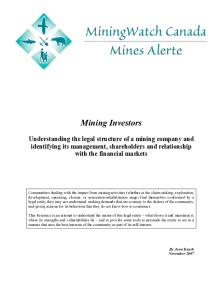Urgent Action: Support legislation to impose standards on Canadian government support for mining companies operating internationally
(Update) Bill C-300 - a "responsible mining bill" - goes to a vote in the House of Commons in September or October.
(Update) Bill C-300 - a "responsible mining bill" - goes to a vote in the House of Commons in September or October.
News Release from Klippensteins, Barristers and Solicitors: (Toronto, June 16, 2010) An Ontario judge has ruled that former Canadian Ambassador to Guatemala, Kenneth Cook, slandered Ph.D. student and videographer Steven Schnoor by making false statements about a documentary video that Schnoor made that was critical of the practices of a Canadian mining company.
University of Toronto law professor Audrey Macklin and Tom Shrake, CEO of Pacific Rim Mining, testify on Private Member's Bill C-300 before the House of Commons Standing Committee on Foreign Affairs Meeting no. 22, June 8, 2010. (Actually Mr. Shrake's comments are more general as he admits he isn't actually familiar with the Bill.)
The creation of large volumes of waste, including solids, liquid effluents, and air emissions, is a fact of life for mining and mineral processing operations. Depending on the minerals’ natural geology and how they are processed these wastes can often be hazardous to the environment and human health. Solid wastes including waste rock and tailings are, by volume, the most significant waste generated by mining and mineral processing. Solid wastes are typically in the tens to hundreds of millions of tons of waste for a single mine.

Community leaders from the region of Cabañas and Santa Marta have come under serious threat in the past months. Please help press Salvadoran authorities to make sure the threats and violence are stopped, and make sure Canadian officials, the Canadian public, and Canadian companies operating in the region are aware of the situation - and your concern.
Bill C-300, An Act Respecting Corporate Accountability for the Activities of Mining, Oil or Gas Corporations in Developing Countries, represents the best chance we have as Canadians to assure that Canadian extractive companies follow human rights and environmental best practices when they operate overseas. It also represents our best chance to assure the accountability of our government to us, as taxpayers and citizens, by assuring that government financial and political support will not be provided to companies that breach human rights and environmental standards.
News release: Indigenous leaders from Porgera in Papua New Guinea (PNG) have traveled to Canada to speak out about devastating impacts in their mountainous community from a Barrick Gold-operated mine. Joining the indigenous leaders are researchers with the International Human Rights Clinic at the Harvard Law School and MiningWatch Canada. Concerns about killings by security guards at the Porgera Joint Venture (PJV) mine, as well as about serious public health, environmental and socio-cultural impacts of the mine have continued since Barrick’s purchase of the mine two years ago. Neither the PNG government nor Barrick have responded effectively to these concerns.
Uranium mining is a highly contentious issue across Canada and globally. Uranium mining, from exploration through to mining, processing, and eventual decommissioning, is risky and dangerous to the environment, wildlife, local peoples and communities, and workers.
Uranium is used for three purposes: weaponry, medical and scientific technology, and energy. MiningWatch Canada believes that there is no public support in Canada for the use of uranium for weaponry, and that medical and scientific technology uses could be well served by existing stockpiles of uranium.

On January 8th and 9th, 2007, hundreds of police and soldiers in Guatemala forcibly evicted the inhabitants of several communities who were living on lands that a Guatemalan military government had granted to Canadian mining company INCO in 1965. Local indigenous people claim the land to be theirs, and resent the exploitation of a foreign corporation. Canada's Skye Resources now lays claim to the land, and paid workers a nominal sum to destroy people's homes.